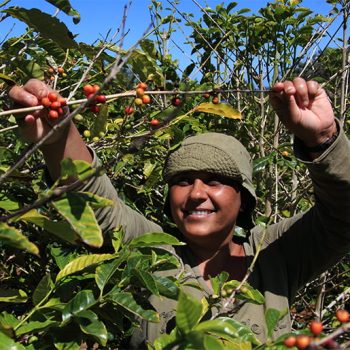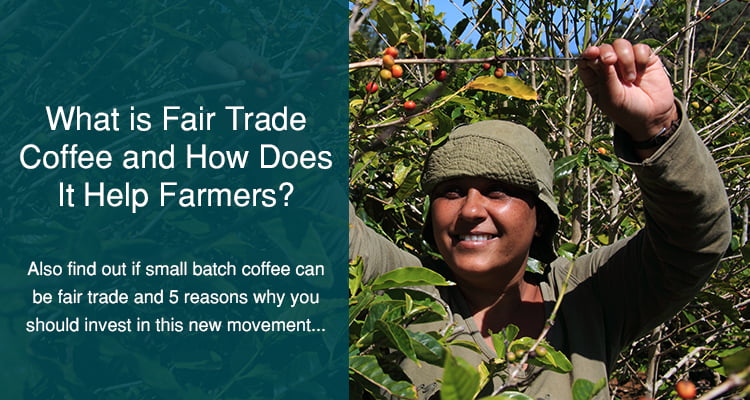

What is Fair trade coffee?
Coffee is well known for being a boom and bust commodity, with production varying year on year according to factors such as weather and plant disease.
This causes huge fluctuations in price which has significant consequences for those who depend on it for their livelihood. It’s hard for growers to predict and manage their income, causing them to struggle immensely when the prices hit rock bottom.
Fair trade was brought in as a response to the collapse of world coffee prices in the late 1980s. It means that whilst the market prices may fluctuate, certified growers are guaranteed to receive the Fair trade Minimum Price for their produce. This acts as a safety net when market prices fall below a sustainable level.
Whilst it provides a minimum price in exchange for the world’s most popular caffeinated drink, growers can still benefit when the market prices rise.
How does Fair Trade help farmers?
There are millions of farmers in developing countries working hard to produce the food that we eat every day. Many of these farmers are not being paid enough and as a result they can’t afford to support their families.
Fair trade helps over 1.65million farmers, nearly 800,000 of those are coffee farmers, to obtain a sustainable price for their produce.
It protects farmers from dramatic price drops by ensuring they always receive the minimum price whilst allowing them to still benefit from when the market price is high.
As a result, farmers have a much more stable income and a better quality of life.
Which countries supply Fair Trade coffee?
As the movement started in response to the struggles of the Mexican farmers following the collapse of coffee prices in the late 1980s, Mexico is a huge producer of Fair trade coffee.
Since its origins in Mexico, the campaign has expanded across the globe and now every country that produces coffee beans has Fair trade certified farmers. This includes: Brazil, Peru, Honduras, Vietnam, Colombia and Indonesia.
Is small batch coffee Fair Trade?
Small batch coffee, which we produce at Adams + Russell, can come from Fair Trade farmers.
One of our most popular is the Colombian Fairtrade Coffee. Also, as of writing this article, the fair trade coffees we have ‘in-season’ are:
On each of the above linked products, you can find detailed information about the farms and the co-operatives themselves.
5 reasons to choose Fair Trade coffee…
Fair price for farmers
The most obvious reason, and the reason that this movement started in the first place, was to help farmers earn a liveable wage from selling their produce.
When you buy certified products, you can be confident that the growers have received at least the Minimum Fair Trade Price.
Supports environmental sustainability
Climate change is one of the number one threats farmers face. That’s part of the reason why environmental protection is engrained in Fair Trade.
To become certified, farmers must improve soil and water quality, manage pests, avoid using chemicals on crops, manage waste and reduce greenhouse gas emissions.
This helps to keep the farms thriving for future generations.
Invests in the local community
When you buy Fair Trade coffee, you are investing a small amount into the local community.
Many operatives reinvest revenue back into the local business and community, which is how things like the Women’s Project, Honduras can happen.
Tastes better and is better for you
The high demand for coffee has led to methods of mass-production that can lead to lower quality produce. Fair Trade farmers use sustainable growing methods and it’s also picked by hand, so only the best beans are selected, resulting in a better tasting cup.
Because these beans are grown without the use of fertilisers or pesticides, they preserve all of their nutrients and flavours too.
Helps preserve and increase biodiversity
Coffee farms can sometimes cause a decline in biodiversity, as they can destroy natural habitats. This is especially true for birds, which often migrate to ‘coffee countries’ in the winter.
To become Fair Trade certified, farmers have to preserve the natural habitats of animals and also improve the nutritional value of the soil which helps wildlife to flourish.
We can already see the positive effects that this is having on biodiversity. Studies from Mexico and Colombia show that the Fair Trade ‘shade-grown’ coffee plantations have up to 95% more bird life than large-scale, ‘sun-grown’ plantations.
Invest in Fair Trade to build a brighter future for the coffee industry…
Although the original goal of Fair Trade was to help farmers in developing countries earn a living wage, it’s clear that the benefits stretch much further than that. It’s also a brilliant environmentally friendly choice and people even suggest that the organic farming methods make it taste better!
Why not pick up a bag of Fair Trade coffee in your next order and let us know whether you can tell a difference?

